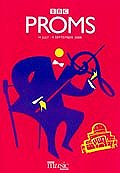 Concert Review
Concert Review
 Concert Review
Concert Review
PROM 48: Franz Schmidt: Das Buch Mit Sieben Siegeln
BBC Singers, BBC Symphony Chorus & BBC Symphony Orchestra Franz
Welser-Möst, RAH, 20 August 2000 (MB)
Franz Schmidt's apocalyptic oratorio, The Book with Seven Seals, received its premiere just over a year before the outbreak of World War II. Tonight's performance at the Royal Albert Hall was its first performance at the Proms, and, amazingly, only the second work by Schmidt ever to be performed here. Conducted by Franz Welser-Möst, it could not have had a more persuasive champion in a performance which was as dramatic as it was thrilling.
Based on the Book of Revelation the oratorio records the vision of St John. As he stands before God the most terrifying picture of turmoil and rebirth is revealed to him: the final battle between the forces of good and evil, the violence that is to befall the earth and the cataclysmic suffering that God has in store for mankind. It ends with the Last Judgement and the creation of a new heaven and earth.
Composed in three parts, The Book with Seven Seals opens with a vast Prologue, the purpose of which is to tell us of how John stood before the Throne of God and saw Christ take the book of prophecy and open the seven seals. Part I dramatically shows us the opening of the first seal, the appearance of the Four Horsemen of the Apocalypse, the summoning of famine and the eventual destruction of the earth by earthquakes and storms. Part II leads into the opening of the seventh seal, the final destruction of Satan and the proclamation of God's new kingdom.
The work generates its power from two separate elements: the vast chorales, which are literally earth-shattering, and the key role of St John. Schmidt's writing for the divine saint is demanding in the extreme, requiring a singer of almost Heldentenor range to make it work. This is no more so than in the vast opening to Part II where the tenor's range must reach several octaves and the voice must at once move between intimacy and dramatic power as he rides over the orchestra like a winged charioteer. Stig Anderson is probably too light toned to make real drama of this part, and it took him some time to produce the declamatory, ringing tone ideal for the role. His long Part II monologue was indeed magnificent, but he had not been a thrilling St John in the Prologue or, indeed, for much of Part I. One missed the dramatic flourishes which Anton Dermota brought to the role in his famous live performance with Mitropoulos (on Sony SM2K 68442).
In the small, but crucial, role of God László Polgár was simply breathtaking. Standing above both orchestra and chorus, the voice broke from the wings like thunder. In 'Ich bin das A und das O', the sheer weight of sound was like a roar from the depths, the tone gloriously rich. This is not a God anyone would want to confront.
The two BBC choruses were magnificent. The Part I section in which the women and warriors confront each other was a tour de force. Schmidt masterfully moves the action from sopranos to basses with a single brushstroke, the effect almost like the genesis of a tsunami as it grows from the slightest ripple to a mountainous pillar of destruction. Welser- Möst was no greater than at this moment of supreme drama as he whipped the orchestra into playing that was simply scintillating. The counterpoint was not only incisive it was elemental. The final chorus of 'Hallelujah! Hallelujah!' was beautifully sung and thrillingly direct.
Welser-Möst does not invest this score with the same intensity of some (Mitropoulos or Zagrosek), but he is the dramatist through to his fingertips. He drew superlative playing from the BBC Symphony Orchestra, not least from muted brass and shattering timpani. The BBC strings had more depth to their tone than I have heard for some time. The organ solos that begin Parts I and II blended a homogeneity of peacefulness and terror superbly. I could literally feel the floor vibrate beneath my feet.
This is such a cosmic work that one performance cannot tell the whole story. I very much hope this great oratorio, one of the greatest of the last century, will one day open the Proms. Small as last night's audience was, it demands to be heard by many more.
Marc Bridle
Seen&Heard is part of Music on the Web(UK) Webmaster: Len Mullenger Len@musicweb-international.com
Return to: Seen&Heard Index
 Return to:
Music on the Web
Return to:
Music on the Web